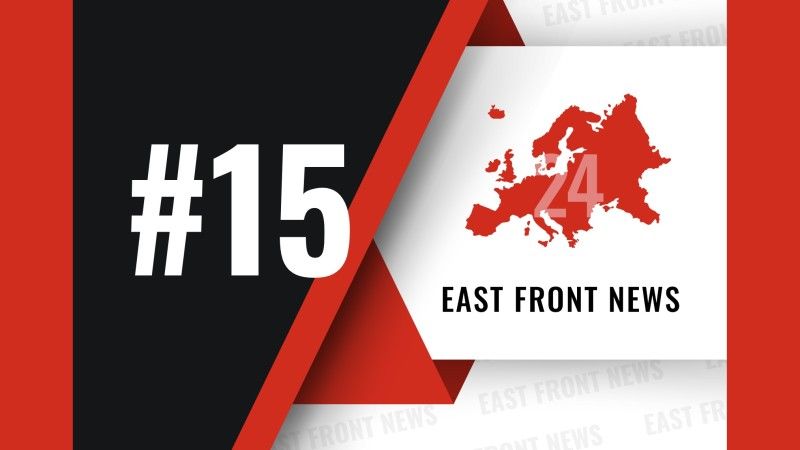Armed Forces
East Front News #15: Polish Record Defence Spending, France Readies Economy Mobilization, and How to Meet The NATO Land Power Targets?

East Front News is a weekly newsletter summarizing the past week’s most important events concerning security and the situation in the Central and Eastern Europe region. It includes original opinions and comments, along with key news items significant from a Polish perspective. If you would like to receive this newsletter, please sign up by clicking
Polish Record Defence Budget in Parliament
Polish government has sent the approved draft budget to Parliament, with record defence spending levels. The defence budget for 2025 is even larger than in previous years. For 2025, Section 29 — National Defence allocates 123.525 billion PLN (approx USD 31.3 billion). In comparison, the 2024 national budget allocated 117.520 billion PLN, while actual spending in 2023 was 97.080 billion PLN. On the top of that, Poland wants to spend over 50 PLN billion secured by debt financing from the Armed Forces Support Fund, which is used mainly to finance high-end modernization projects, such as the recent Apache helicopter purchase, the procurements of K2 tanks, K9 & Homar-K (Chunmoo) artillery systems and FA-50/FA-50PL light combat aircraft. There are substantial concerns, however, on the feasibility of the financing by the Armed Forces Support Fund. It’s important to remember that the debt of the Armed Forces Support Fund is guaranteed by the State Treasury and will eventually need to be repaid either through state revenue or by taking on more loans or issuing new bonds.
Rak Mortar requested by USA, Progress in Heavy IFV for Poland and Changes in Miecznik frigate
„I can only say that we have received an inquiry from the United States regarding the 120mm Rak self-propelled mortar and confirm that full export rights for this system are in PGZ’s hands”, said Jan Grabowski, a member of the board of PGZ, in an interview with Defence24.pl. - Currently, the selection process and the entire CBWP (Heavy IFV) programme have entered the next phase. Out of several bidders, three remain, as they provided the most favorable answers to the questions posed in the first phase. The committee, consisting of experts from PGZ Group companies specializing in vehicle production and systems for armored vehicles, is now in discussions with the bidders about further cooperation. We aim for the highest possible level of domestic production and technology transfer, which we view as a key element of our future recommendations - he added. The interview also mentions substantial changes in Miecznik frigate programe and the maritime domain of PGZ in general, as well as other projects such as the New Wheeled Armored Vehicle.
Poland and Allies will Struggle to Meet NATO Capability Requirements
To meet combat capability requirements and effectively deter Russia, NATO countries need 131 land brigades. This is over 50% more than they could field just three years ago, „Die Welt” reported. The new guidelines are a result of political decisions made at NATO’s 2023 summit in Vilnius, where leaders agreed that NATO should have the capability to defend its entire treaty territory and keep its forces in constant readiness. It’s no secret that meeting these requirements will be a huge challenge for NATO countries. Equipping and staffing newly formed units alone could be an enormous challenge. NATO’s planning guidelines also have consequences for Poland. On one hand, they mean Poland must continue expanding its Armed Forces, particularly the Land Forces. The reason is simple: Poland is a NATO member and must meet its commitments for both self-defense and collective defense under Articles 3 and 5 of the Washington Treaty. Moreover, countries like Germany and the Netherlands are likely to struggle to reach the required force levels, especially in the land domain. This makes it even more critical for Poland to build up its military potential - particularly in the land domain where in all likehood European NATO countries have more capability gaps compared to Russia than say in the maritime or air domain.
Polish Chief of Defence Warns of War, and Will Not Be Dismissed
Last Friday, during the inauguration of the academic year at the Land Forces Military Academy (AWL), Polish Chief of Defence General Wiesław Kukuła stated, „Everything indicates that we are the generation that will stand with arms in hand to defend our state.” According to Kukuła, the demographic conditions in Poland require the introduction of a model of universal military service due to threats from the east. Kukuła’s statement has circulated in the media, eliciting comments from politicians, former military personnel, and commentators. There will be no dismissal of the Chief of the General Staff of the Polish Armed Forces, said Deputy Minister of Defence Cezary Tomczyk in an interview with Radio Zet, when asked about General Wiesław Kukuła’s statement. He also denied that the ministry intended to reinstate conscription.
Leopard 2PL Tanks Go to Latvia
Polish soldiers from the 11th „Lubuska” Armored Cavalry Division will be heading for their next rotation with the Polish Military Contingent (PKW) in Latvia, now equipped with new tanks. As part of the NATO battle group, led by Canada acting as the framework nation, Poland’s Leopard 2 PL tanks are expected to be deployed. The NATO multinational battle group (eFP NATO), currently stationed in Latvia, includes an important component from the Polish Army. Previously, Polish tank crews in Latvia operated PT-91 Twardy tanks, which are now becoming outdated. However, according to Defence24, the next rotation being prepared will involve sending more modern Leopard 2 PL main battle tanks to support the Latvian ally.
UN Soldiers Injured Due to Israeli Actions
On October 10, the United Nations Interim Force in Lebanon (UNIFIL) observation tower in Naqoura was shelled by the Israeli army using a Merkava tank. Two peacekeeping soldiers were injured in the attack. This incident is not isolated, as the Israel Defence Forces (IDF) allegedly also opened fire on Position 1-31 in Labbouneh, damaging the communication system and vehicles stationed there. Additionally, the Israeli army is reported to have destroyed cameras monitoring the perimeter of a UNIFIL post and shelled the UNP 1-32A checkpoint. For over a year, Prime Minister Benjamin Netanyahu’s government has been conducting operations in the Gaza Strip, and more recently, Israel launched a ground operation in southern Lebanon. These actions seem to reflect Israel’s determination to decisively deal with Hamas and Hezbollah, as further suggested by Israel’s military actions and the declaration of UN Secretary-General António Guterres as persona non grata by Israel. The current situation in the Middle East is rapidly evolving and highly unstable, with the conflict threatening to engulf the entire region. Israel has yet to respond to the Iranian attack carried out on October 1.
North Korean Soldiers in Ukraine?
Kim Yong-hyun, the Minister of Defence of the Republic of Korea, outlined upcoming plans for cooperation between North Korea and Russia, describing their collaboration as verging on a military alliance. The South Korean defence chief confirmed that North Korean soldiers may have been injured or killed in Ukraine. It is not unlikely that their involvement was connected with the use of North Korean KN-23 ballistic missiles by Russia. Relations between Moscow and Pyongyang have tightened following Russia’s invasion of Ukraine, especially as international actions sought to isolate the Kremlin. North Korea, long marginalized in global diplomacy due to its authoritarian regime, sees its growing ties with Russia as an opportunity to gain economic aid and access to advanced technology. In return, Russia receives military support, which it uses in its ongoing conflict. This alliance is causing significant concern in the West, as the Kremlin, under its aggressive policies, receives crucial support, and it poses a particular threat to South Korea, given Kim Jong Un’s increasingly hostile rhetoric toward Seoul. South Korea has also stepped up its involvement in Europe, including strengthening ties with Poland, which is making substantial investments in its defence sector by procuring equipment from South Korean companies.
France Prepares for Economic Mobilization as Poland Observes Closely
In response to growing national security threats, France has introduced new regulations allowing for the temporary requisition of resources and personnel during crises. The decree enables the use of essential resources and the mobilization of individuals to safeguard the country against threats, including cyberattacks. It also provides for supporting allies in conflict, such as through the transfer of weapons. The Minister of Defense emphasizes that the regulations ensure the rights of mobilized individuals, guaranteeing appropriate compensation and full reimbursement for their participation in defense activities. Similar „war economy” measures are expected to be introduced in Poland. While new legislation is not currently needed, a comprehensive mobilization plan is already being discussed.
If you would like to receive this newsletter, please sign up by clicking .
East Front News is a weekly newsletter and article on Defence24.com summarizing the past week’s most important events concerning security and the situation in the Central and Eastern Europe region. It includes original opinions and comments, along with key news items significant from a Polish perspective.
Aleksander Olech, PhD & Jakub Palowski, Deputy Ed. in Chief
